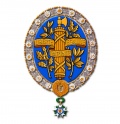Chalautre-la-Petite: Difference between revisions
Jump to navigation
Jump to search
Knorrepoes (talk | contribs) m (Text replacement - "|↵'''Country''' : France" to "| <center>''' {{uc:{{PAGENAME}}}} '''</center><br> '''Country''' : France") Tags: Mobile edit Mobile web edit |
Knorrepoes (talk | contribs) m (Text replacement - "''':[[" to "''': [[") |
||
| (3 intermediate revisions by the same user not shown) | |||
| Line 4: | Line 4: | ||
| | | | ||
<center>''' {{uc:{{PAGENAME}}}} '''</center><br> | <center>''' {{uc:{{PAGENAME}}}} '''</center><br> | ||
'''Country''' : France [[File:france.jpg|60 px|right]]<br><br><br> | '''Country''':France [[File:france.jpg|60 px|right]]<br><br><br> | ||
'''Département''' : [[Seine-et-Marne]][[File:Seine-et-Marne.jpg|60 px|right]] | '''Département''': [[Seine-et-Marne]][[File:Seine-et-Marne.jpg|60 px|right]] | ||
{{#display_map:48.52874,3.31376|width=250|height=250|zoom=7}} | {{#display_map:48.52874,3.31376|width=250|height=250|zoom=7}} | ||
| Line 14: | Line 14: | ||
|- | |- | ||
|'''French''' | |'''French''' | ||
| Tiercé en pairle renversé: au 1er d'argent à la divise ondée abaissée d'azur et au sémaphore de Chappe de sable brochant, au 2e de gueules à la gerbe de blé d'or liée du même, au 3e d'azur à saint Matin à cheval d'argent accosté de deux fleurs de lis d'or. | | Tiercé en pairle renversé:au 1er d'argent à la divise ondée abaissée d'azur et au sémaphore de Chappe de sable brochant, au 2e de gueules à la gerbe de blé d'or liée du même, au 3e d'azur à saint Matin à cheval d'argent accosté de deux fleurs de lis d'or. | ||
|- | |- | ||
|'''English''' | |'''English''' | ||
| Line 25: | Line 25: | ||
The semaphore in the first quarter symbolises Claude Chappe (1763-1805), who in 1792 demonstrated a practical semaphore system that eventually spanned all of France. He was a priest in the village. The wavy bar symbolises the Méances river in the village. Saint Martin of Tours is the local patron saint. The garb symbolises the agricultural character of the village and the colour red the blood of some hostages being killed in the village in 1944. | The semaphore in the first quarter symbolises Claude Chappe (1763-1805), who in 1792 demonstrated a practical semaphore system that eventually spanned all of France. He was a priest in the village. The wavy bar symbolises the Méances river in the village. Saint Martin of Tours is the local patron saint. The garb symbolises the agricultural character of the village and the colour red the blood of some hostages being killed in the village in 1944. | ||
[[Civic Heraldry Literature - France|'''Literature''']]: Image from http://www.armorialdefrance.fr | [[Civic Heraldry Literature - France|'''Literature''']]:Image from http://www.armorialdefrance.fr | ||
{{ | {{fr}} | ||
{{media}} | {{media}} | ||
Latest revision as of 06:54, 15 August 2024
|
Country:France Département: Seine-et-Marne |
| French | Tiercé en pairle renversé:au 1er d'argent à la divise ondée abaissée d'azur et au sémaphore de Chappe de sable brochant, au 2e de gueules à la gerbe de blé d'or liée du même, au 3e d'azur à saint Matin à cheval d'argent accosté de deux fleurs de lis d'or. |
| English | blazon wanted |
Origin/meaning
The arms were officially adopted in 2022.
The semaphore in the first quarter symbolises Claude Chappe (1763-1805), who in 1792 demonstrated a practical semaphore system that eventually spanned all of France. He was a priest in the village. The wavy bar symbolises the Méances river in the village. Saint Martin of Tours is the local patron saint. The garb symbolises the agricultural character of the village and the colour red the blood of some hostages being killed in the village in 1944.
Literature:Image from http://www.armorialdefrance.fr
French heraldry portal
This page is part of the French heraldry portal |
Heraldry of the World |
|
French heraldry:
Overseas territories:
|
Selected collector's items from France:
|
Contact and Support
Partners:
Your logo here ?
Contact us
© since 1995, Heraldry of the World, Ralf Hartemink 
Index of the site














